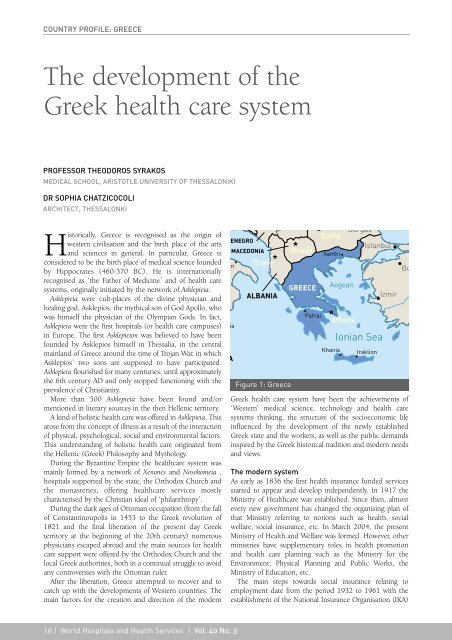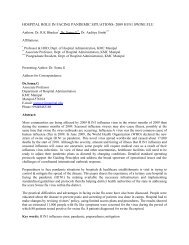World Hospitals and Health Services - International Hospital ...
World Hospitals and Health Services - International Hospital ...
World Hospitals and Health Services - International Hospital ...
You also want an ePaper? Increase the reach of your titles
YUMPU automatically turns print PDFs into web optimized ePapers that Google loves.
COUNTRY PROFILE: GREECE<br />
The development of the<br />
Greek health care system<br />
PROFESSOR THEODOROS SYRAKOS<br />
MEDICAL SCHOOL, ARISTOTLE UNIVERSITY OF THESSALONIKI<br />
DR SOPHIA CHATZICOCOLI<br />
ARCHITECT, THESSALONKI<br />
Historically, Greece is recognised as the origin of<br />
western civilisation <strong>and</strong> the birth place of the arts<br />
<strong>and</strong> sciences in general. In particular, Greece is<br />
considered to be the birth place of medical science founded<br />
by Hippocrates (460-370 BC). He is internationally<br />
recognised as ‘the Father of Medicine’ <strong>and</strong> of health care<br />
systems, originally initiated by the network of Asklepieia.<br />
Asklepieia were cult-places of the divine physician <strong>and</strong><br />
healing god, Asklepios, the mythical son of God Apollo, who<br />
was himself the physician of the Olympian Gods. In fact,<br />
Asklepieia were the first hospitals (or health care campuses)<br />
in Europe. The first Asklepieion was believed to have been<br />
founded by Asklepios himself in Thessalia, in the central<br />
mainl<strong>and</strong> of Greece around the time of Trojan War, in which<br />
Asklepios’ two sons are supposed to have participated.<br />
Asklepieia flourished for many centuries, until approximately<br />
the 6th century AD <strong>and</strong> only stopped functioning with the<br />
prevalence of Christianity.<br />
More than 500 Asklepieia have been found <strong>and</strong>/or<br />
mentioned in literary sources in the then Hellenic territory.<br />
A kind of holistic health care was offered in Asklepieia. This<br />
arose from the concept of illness as a result of the interaction<br />
of physical, psychological, social <strong>and</strong> environmental factors.<br />
This underst<strong>and</strong>ing of holistic health care originated from<br />
the Hellenic (Greek) Philosophy <strong>and</strong> Mythology.<br />
During the Byzantine Empire the healthcare system was<br />
mainly formed by a network of Xenones <strong>and</strong> Nosokomeia ,<br />
hospitals supported by the state, the Orthodox Church <strong>and</strong><br />
the monasteries, offering healthcare services mostly<br />
characterised by the Christian ideal of ‘philanthropy’.<br />
During the dark ages of Ottoman occupation (from the fall<br />
of Constantinoupolis in 1453 to the Greek revolution of<br />
1821 <strong>and</strong> the final liberation of the present day Greek<br />
territory at the beginning of the 20th century) numerous<br />
physicians escaped abroad <strong>and</strong> the main sources for health<br />
care support were offered by the Orthodox Church <strong>and</strong> the<br />
local Greek authorities, both in a continual struggle to avoid<br />
any controversies with the Ottoman ruler.<br />
After the liberation, Greece attempted to recover <strong>and</strong> to<br />
catch up with the developments of Western countries. The<br />
main factors for the creation <strong>and</strong> direction of the modern<br />
ENEGRO<br />
MACEDONIA<br />
ri<br />
ia<br />
a<br />
A<br />
Tirane<br />
ALBANIA<br />
GREECE<br />
Xanthi<br />
Aegean<br />
Khania<br />
Ionian Sea<br />
Iraklion<br />
Mediterranean Sea<br />
Figure 1: Greece<br />
Skopje<br />
Patrai<br />
Sofia<br />
Athens<br />
Burgas<br />
Istanbul<br />
Izmir<br />
Greek health care system have been the achievements of<br />
‘Western’ medical science, technology <strong>and</strong> health care<br />
systems thinking, the structure of the socioeconomic life<br />
influenced by the development of the newly established<br />
Greek state <strong>and</strong> the workers, as well as the public dem<strong>and</strong>s<br />
inspired by the Greek historical tradition <strong>and</strong> modern needs<br />
<strong>and</strong> views.<br />
The modern system<br />
As early as 1836 the first health insurance funded services<br />
started to appear <strong>and</strong> develop independently. In 1917 the<br />
Ministry of <strong>Health</strong>care was established. Since then, almost<br />
every new government has changed the organising plan of<br />
that Ministry referring to notions such as health, social<br />
welfare, social insurance, etc. In March 2004, the present<br />
Ministry of <strong>Health</strong> <strong>and</strong> Welfare was formed. However, other<br />
ministries have supplementary roles in health promotion<br />
<strong>and</strong> health care planning such as the Ministry for the<br />
Environment, Physical Planning <strong>and</strong> Public Works, the<br />
Ministry of Education, etc.<br />
The main steps towards social insurance relating to<br />
employment date from the period 1932 to 1961 with the<br />
establishment of the National Insurance Organisation (IKA)<br />
Bu<br />
10 | <strong>World</strong> <strong><strong>Hospital</strong>s</strong> <strong>and</strong> <strong>Health</strong> <strong>Services</strong> | Vol. 40 No. 3

















